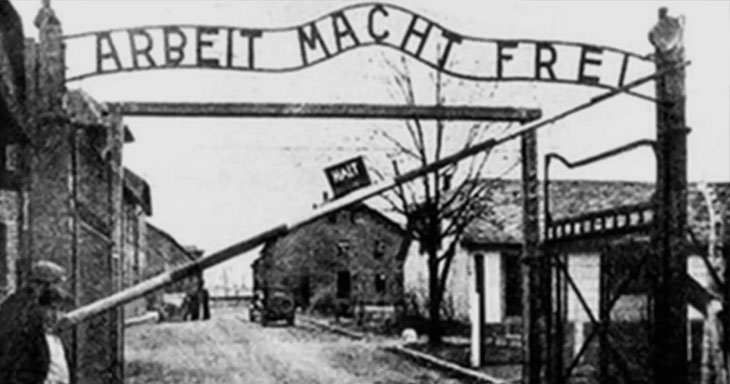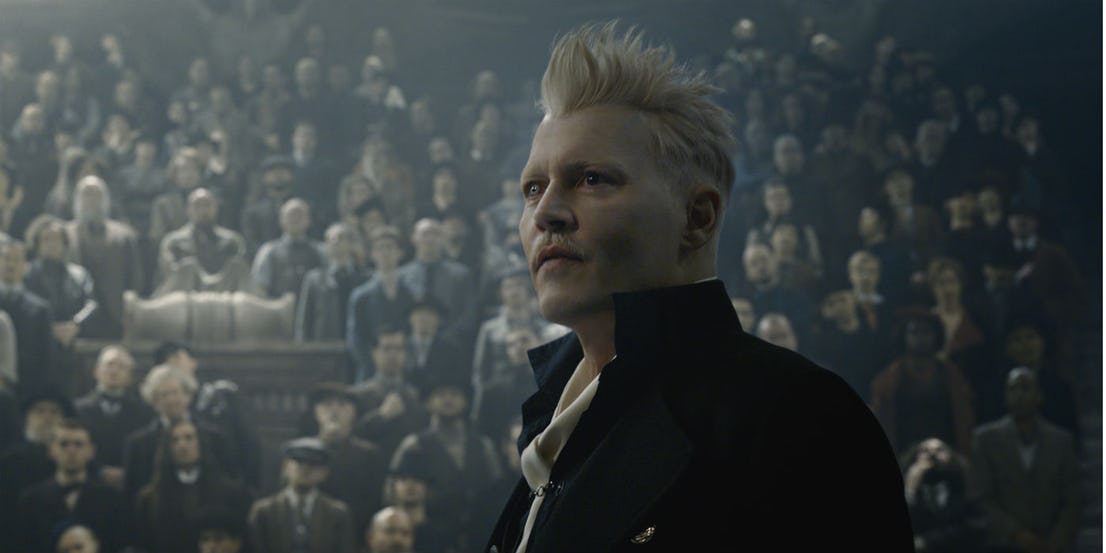I wasn’t even sure I wanted to go see the new Fantastic Beasts film. My siblings and I (all three of us are big Harry Potter fans) went to see Fantastic Beasts and Where to Find Them together and walked out of the theater deeply disappointed in it. There was excitement over the expansion of the Harry Potter world, yes, but the plot fell flat. And then there was the whole problem of Johnny Depp. And J.K. Rowling’s history of problematic statements. (Even though she is great at calling out anti-Semitism on Twitter, that doesn’t change anything.)
So when the sequel, Fantastic Beasts: The Crimes of Grindelwald (one of four more films in this franchise), came out, I felt deeply ambivalent. I debated if going to see it meant supporting Johnny Depp, an abuser, even though there were other artists (Zoë Kravitz) whom I wanted to support.
But when it came down to it, I still have a love for Harry Potter and the magical world that changed my childhood. So reader: I went to see it anyway. And surprise (not surprising, I guess?)… it was terrible!
There are many problems with the film; there were plot holes and things that were distinctly contradicting the canon and characters that seemingly have no purpose or motivations (I recommend you read Alanna Bennett’s amazing piece, “‘The Crimes of Grindelwald’ Is A Mess”). Honestly, there are too many issues go into here — so let’s focus on the Jewish ones, shall we?
SPOILERS AHEAD!
The problem is two-fold: misuse of Holocaust imagery and mischaracterization of Queenie Goldstein.
Let’s start with the more egregious problem: Holocaust imagery. In the big scene of the film, which takes place in the late 1920s, Grindelwald (Depp) has gathered all of his followers at a Parisian cemetery for a rally. I’ll just quote from the Wikipedia plot summary here: “At the rally, Grindelwald preaches ‘freedom’ from laws forcing wizards to remain hidden from Muggles, and uses future images of World War II to call for world-wide wizard supremacy and domination.”
Guess what images of WWII are included? If you guessed the Holocaust, you win! There’s an image of a mass of people — Jews, clearly — on a death march, likely to a death camp. It’s a jarring image amidst the other ones of war and tanks, and wholly unnecessary.
the fact that crimes of grindelwald literally included imagery of a concentration camp…. joanne rowling you have lost your MIND.
— han yolo (@roymcbrides) November 17, 2018
The idea here is that Muggles will fuck things up so badly, it will lead to the Holocaust, so Grindelwald is trying to prevent that by enslaving them. This is terrible logic. As one Twitter user pointed out, “positing that ‘actually, wizards TRIED to stop the Holocaust (!) but they couldn’t’ is so harmful?! even in a fictional setting, it’s taking the blame from LITERAL NAZIS and being disgustingly flippant.” It’s deeply harmful to its Jewish viewers.
In an important article titled “J.K. Rowling, Hollywood, and the Holocaust,” Nara Monteiro writes, “Fantastical rewritings of traumatic historical events risk overwhelming fact, and if anyone has the cultural power to rewrite history, it’s J.K. Rowling.”
Fantastic Beasts And Where To Find The Inexplicable Reason JK Rowling Clearly Implies That Grindelwald Would Have Stopped The Holocaust
— Sam Haft 🍉 (@SamHaft) November 18, 2018
The use of the Holocaust in the film is problematic for a few reasons. One, Grindelwald is rising to power in the 1920s and ’30s on ideas about “blood purity” — that pureblood wizards should rule over everyone else. This parallels Hitler’s rise to power in Nazi Germany, where he viewed Jews as less than Germans. Basically, Grindelwald is synonymous with Hitler in the Harry Potter canon.
Two, in the books, Harry learns “For the Greater Good” is a phrase Grindelwald used “to justify his horrific actions in the 1940s global wizarding war and it was engraved over the entrance of Nurmengard, the prison he constructed to house those who opposed him.” (Does Nurmengard sound eerily like Nuremberg? That’s the point.) It’s also a reference to “Work makes one free” (Arbeit macht frei in German), the motto inscribed on the entryway to many concentration camps.

In an interview in 2005, Rowling said, “It amuses me to make allusions to things that were happening in the Muggle world, so my feeling would be that while there’s a global Muggle war going on, there’s also a global wizarding war going on.” She implied there was a connection between the two, but more that they existed simultaneously; not one as the cause of the other. This is a healthier view of history. What she’s doing with the films now is an issue.
Three, showing images of concentration camps — and implying that Grindewald believes he and his followers can stop the Holocaust — is a dangerous blurring of lines between history and fantasy. As Monteiro explains, “When an author like Rowling enmeshes genocide with magic, it implicates outside forces. Sure, it may be fiction, but it also strips the cultural burden of fault and guilt from Nazi leaders and places at least some of it into the hands of supernatural forces.” Further, “it also allows Rowling to engage with the Holocaust without meaningfully grappling with anti-Semitism, then or now.”
There are enough problems with Holocaust denial today; why make it worse? On Holocaust Remembrance Day 2018, the Claims Conference released a study saying a fifth of millennials in the U.S. have not heard of the Holocaust. A FIFTH! That’s bananas. I’m sure a lot more of them have heard of Harry Potter. Ugh.
It’s all very frustrating, but let’s move onto Queenie.
First, some context: the characters Tina and Queenie, Rowling confirmed via Twitter, have the surname “Goldstein” and are distantly related to the ONE Jewish wizard in the Harry Potter series, Anthony Goldstein. (He wasn’t ever mentioned as Jewish in the books; Rowling just tweeted about his heritage after the fact, which, does that really count as Jewish representation? Ugh.)
Well, I think it's widely known that that characters of (Porpen)tina and Queenie are sisters, but not that their surname is Goldstein.
— J.K. Rowling (@jk_rowling) August 15, 2015
As Deborah Krieger wrote in The Mary Sue in January 2017, there is “no mention of anything explicitly Jewish in the movie. Tina and Queenie Goldstein are competent witches, loving sisters, and promising characters on the whole, but there’s not so much as a pair of candlesticks or a mezuzah in their boardinghouse apartment for the Jews watching the movie to recognize. And even though Rowling herself has even confirmed that these Goldsteins are related to Anthony Goldstein, which increases the likelihood of their being Jewish, nothing in the film’s text itself makes this implication canon.”
So even though the Goldstein sisters are coded Jewish, they are never explicitly Jewish. We’re treating them as Jewish, though, cause J.K. Rowling implied it and that’s the best we’re gonna get.
As I wrote above, Grindelwald is basically equivalent to Hitler in this film, so to make Queenie, a Jewish wizard, one of his followers makes zero sense. In the story, Queenie can read minds. So while the movie tries to argue that she follows him because she just wants to marry her non-magical boyfriend, she knows Grindelwald’s murderous intent. She would have known better!
As reporter Julia Reinstein tweeted, “they’re hinting that QUEENIE GOLDSTEIN, who is supposed to be Jewish, becomes a sort-of-Nazi?? jfc nope” which pretty much sums up how I feel.
Alex Doenau further adds in Trespass Magazine, “the confused politics [are] baked into the plot, which include Grindelwald promoting a holocaust to prevent the Holocaust, to an audience consisting partly of witches and wizards of African extraction and several Jewish-named magic users.” Literally WHY. WHY!
Essentially:
https://twitter.com/elbirdilara/status/1063280186165125120
We’re so disappointed in you, Crimes of Grindelwald.



